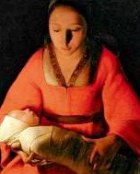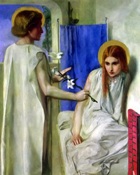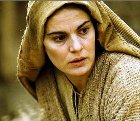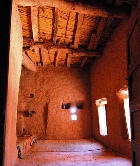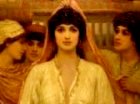Canaan
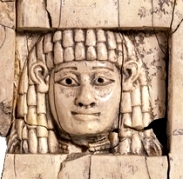 An area of territory including present-day Lebanon and Israel. The Canaanites governed the land, particularly the fertile plains, with a sophisticated system of city-states. Their religious beliefs centered on the power and harmony of Nature, and on the fertility of all living things. Canaanite myths told of the cycle of annual seasons, and of the forces of water, sun, rain and wind. There were four main gods: Anat was a builder, and a fierce defender of her family; the goddess Asherah personified the fertility of all female creatures; Baal controlled water on the earth, in rain and in rivers; and the god El was the source of law and authority.
An area of territory including present-day Lebanon and Israel. The Canaanites governed the land, particularly the fertile plains, with a sophisticated system of city-states. Their religious beliefs centered on the power and harmony of Nature, and on the fertility of all living things. Canaanite myths told of the cycle of annual seasons, and of the forces of water, sun, rain and wind. There were four main gods: Anat was a builder, and a fierce defender of her family; the goddess Asherah personified the fertility of all female creatures; Baal controlled water on the earth, in rain and in rivers; and the god El was the source of law and authority.
Clan
A loose association of extended families, living in the same area and having common ancestors.
Concubine
A secondary wife, with legal protection but without the full status of a primary wife. A concubine usually came to her husband without a dowry, or was a woman who had previously been a slave. 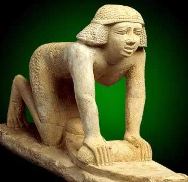 She might be a semi-servant for the primary wife. Her status was raised if she gave birth to her husband’s child.
She might be a semi-servant for the primary wife. Her status was raised if she gave birth to her husband’s child.
Coup d’etat
A political term, denoting a violent or illegal overthrowing of the government
Creation story
A story that explains how the earth and all that is in it came into being.
Disciple
Teachers in the ancient world had a group of students (of any age) who followed them, listened to their teaching, and learned from them. These students were called ‘disciples’.
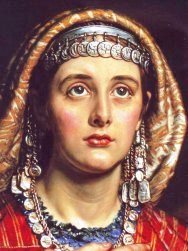 Dowry
Dowry
Property handed over the by bride’s family at the time of the marriage, and afterwards owned by the wife. It was her share of the family inheritance, enough to act as an income for her should she be abandoned or widowed.
Family
In the Bible, this word usually meant the clan or extended kinship group, including not only parents, children, aunts and uncles and cousins, grandparents etc., but also the people who worked with and for the group, and their families as well. A ‘family’ could very easily include as many as two hundred people or as few as ten, depending on the status and income of the group.
Genealogy
The study of ancestors
Go’el
The word go’el is often translated in English as ‘next of kin’, but it means more than that. A go’el was a close male relative who had the duty of looking 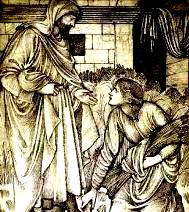 after family members in the absence of the male head of the family. When an Israelite man died, the go’el was expected to marry his widow, if she wished it (see Deuteronomy 25).
after family members in the absence of the male head of the family. When an Israelite man died, the go’el was expected to marry his widow, if she wished it (see Deuteronomy 25).
Hebrews
Until the period of settlement in Canaan, the people of the Bible are called ‘Hebrews’. After settlement in Canaan, later Israel, they are called ‘Israelites’.
Israelites
The people who settled in Canaan during the invasion/settlement period were called ‘Israelites’. They made up the twelve tribes if Israel. After the period of the exile in Babylon, the people of Israel were called ‘Jews’. They derived from the two tribes of the Kingdom of Judah, and their descendents.
Levirate law
The Levirate law regarding the marriage rights of a woman was expressed in Deuteronomy 25:5-10. If a man died, and his wife had not yet had a child by him, she could go to his brother and demand that he marry her and give her a child. This child would inherit the property of the dead husband. This practical law was about two things: the woman’s right to have children, by which she gained status, and the desire to keep property within the family.
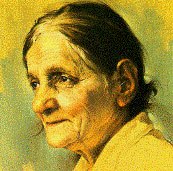 Matriarch
Matriarch
This was the woman of the central family who had the highest social standing and was given the most respect. She was responsible for the well-being of all the members of the clan/group, and was expected to oversee all the tasks performed by the women. She governed and made the day-go-day rules, and solved disputes between women.
Mikveh
A special pool of clean water in which a woman was required to bathe herself after her menstrual period. The mikveh-pool had to be designed and built in a special way, so that it had enough head-room under water to allow complete immersion; a supplementary tank for gathering clean rain water; and a small pool at the entrance, for rinsing hair, hands and feet before entering the main pool.
Nomadic
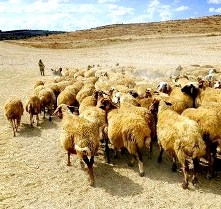
A term used to describe groups of people who followed their flocks of animals from pasture to pasture, according to the seasons and grazing conditions.
Ossuary
A box, often decorated with carving, in which skeletal bones were stored after the flesh had decomposed. The large bones were placed at the bottom of the box, and the smaller ones and skull were placed on top.
Post-partum
This term is used to describe the weeks immediately following the birth of a child.
Philistines
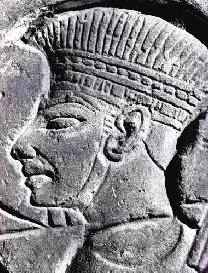 The Philistines were one of the so-called ‘Sea Peoples’. Between 1200 and 1000BC the Sea Peoples invaded Egypt and Canaan. They had well-disciplined armies, and superior iron weapons. They attempted to invade Egypt, but Ramses III (1198-1167BC) drove them off. They met less resistance in Canaan, and settled in the coastal strip of land running between modern-day Tel Aviv and Gaza. They built five large city-states, Ashdod, Ashkelon, Edron, Gath and Gaza. Though they never occupied all the land, they gave their name to Palestine.
The Philistines were one of the so-called ‘Sea Peoples’. Between 1200 and 1000BC the Sea Peoples invaded Egypt and Canaan. They had well-disciplined armies, and superior iron weapons. They attempted to invade Egypt, but Ramses III (1198-1167BC) drove them off. They met less resistance in Canaan, and settled in the coastal strip of land running between modern-day Tel Aviv and Gaza. They built five large city-states, Ashdod, Ashkelon, Edron, Gath and Gaza. Though they never occupied all the land, they gave their name to Palestine.
Semi-nomadic
People who had their base in a village but lived part of the year in upper or lower pasture areas.
Synagogue
A building where people gather to read and discuss the Scriptures. There were thousands of synagogues through Palestine. They were public buildings in which people could meet, talk, pray, argue, share information and sing. Anyone might attend them. Visitors were welcome. Sacrifices were not offered in synagogues.
Bible study activities
has lists of relevant films, individual and group tasks, focus questions, meditations
Young People in the Bible
Mary’s dilemma at the Annunciation
Top Ten Bible Films
All your favorites
Bible Buildings: Houses
In cities like Jerusalem or villages like Nazareth
Bible Heroines: Ruth
Loyal to Naomi and to God
Meditation for Parents
Looking for a meditation
to help you through the day?

